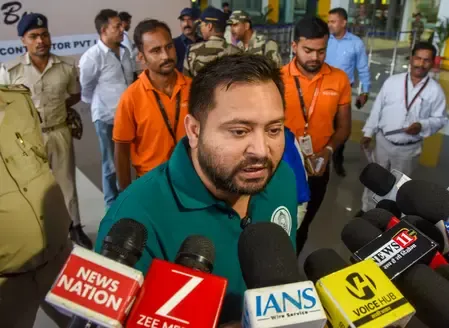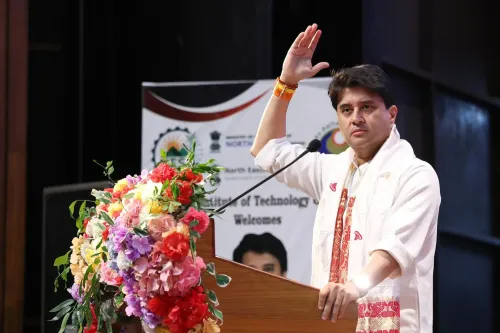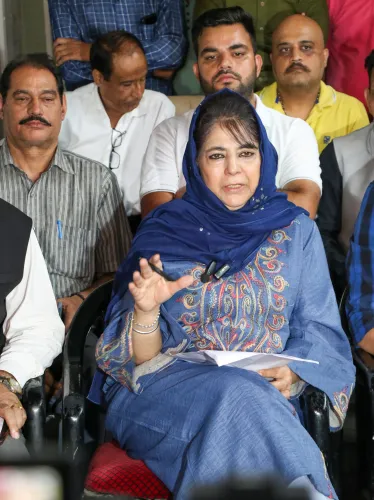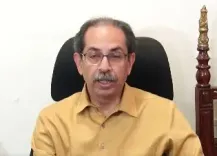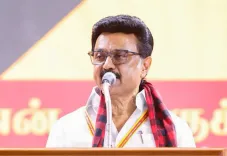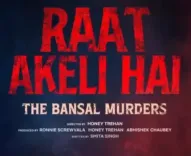Will Terrorism Continue Unless Pakistan's Army and ISI are Defeated?

Synopsis
Key Takeaways
- Operation Sindoor has targeted terror camps in Pakistan.
- The root causes of terrorism must be addressed.
- Political reactions can undermine national security efforts.
- The Pakistani military narrative is often misleading.
- True patriots support the military regardless of religion.
Jammu, May 8 (NationPress) The former Director General of Police (DGP) of Jammu & Kashmir, S.P. Vaid, emphasized that while the elimination of terror camps can provide a short-term solution to terrorism, the true challenge lies in confronting the Pakistan Army and the ISI to achieve sustainable peace.
In an exclusive interview with IANS following the successful execution of Operation Sindoor, which involved India’s precise military strikes on terror camps in Pakistan and Pakistan-occupied Kashmir (PoK), Vaid criticized Congress leaders Udit Raj and Prithviraj Chavan for their objections to naming the operation ‘Sindoor’, labeling their comments as politically charged and unnecessary.
IANS: Under Operation Sindoor, the Indian military dismantled nine terror camps, yet Pakistan claims only six were affected. How do you respond to this narrative?
Vaid: It’s important for people to heed the statements from the Indian government. Pakistan consistently denies its losses and fabricates narratives. Their military thrives on hatred and deception. In contrast, the Indian government provided comprehensive details in its press briefing, including the exact coordinates of the nine targeted camps. While Pakistan may spin tales of civilian casualties, we should trust the official accounts from India.
IANS: Pakistan’s Defence Minister suggests that if India halts Operation Sindoor, they will also cease their actions. What’s your take?
Vaid: If that’s genuinely their stance, it could prevent escalation and a larger conflict, which benefits everyone. However, I doubt such decisions occur without the Army Chief’s command.
IANS: Will terrorism cease following Operation Sindoor?
Vaid: Not entirely. This will be a prolonged struggle. Until the Pakistani Army and ISI are directly confronted, terrorism will persist. While the current operations may instill fear, they are insufficient. The underlying power structures must be dismantled.
IANS: Family members of terrorist Masood Azhar reportedly perished in the strikes. He mentioned it would have been better had he died. What are your thoughts?
Vaid: We don’t wish for him to die yet. He should endure the repercussions of the terror he has propagated. Let him experience the consequences.
IANS: The UN Secretary-General has called for restraint from both India and Pakistan. What’s your perspective?
Vaid: The UN should take a firm stance against terrorism. This situation is a byproduct of Pakistan’s jihad and its attempts at Ghazwa-e-Hind. Innocent lives have been lost due to religious identification. India is merely responding to these aggressions. The UN must learn to differentiate between right and wrong. India is engaged in a righteous struggle. It is unfair and misleading to equate the two nations.
IANS: Recently, the Taliban claimed responsibility for a suicide attack at a Sufi shrine in Lahore, resulting in 10 fatalities. How do you view this event?
Vaid: The Taliban refuses to acknowledge the Durand Line. Groups like TTP and BLA are mounting significant pressure on Pakistan. There is no support for the Pakistan Army, not even from its own populace. The conditions in Balochistan, PoK, Sindh, and Khyber Pakhtunkhwa demonstrate that oppression has turned the people against them.
IANS: In Balochistan, 14 Pakistani soldiers lost their lives in twin assaults claimed by the Balochistan Liberation Army (BLA). What’s your reaction?
Vaid: The BLA and the Taliban are both inflicting heavy losses. Pakistan must allow Balochistan its freedom. The ongoing fatalities of soldiers indicate a need for them to withdraw from the area.
IANS: Congress leader Udit Raj criticized the term ‘Sindoor’ in the operation’s title, asserting it pertains to a specific religion. Would you like to share your thoughts?
Vaid: I strongly disagree. Sindoor is an integral part of Indian culture and is not confined to any single religion. Let’s not communalize it.
IANS: Congress leader Prithviraj Chavan has claimed that the name ‘Operation Sindoor’ seeks to invoke Hindu sentiments. How would you respond?
Vaid: Only his sentiments seem to be offended, no one else’s. The operation was communicated by Col. Sofia Qureshi, whose father feels immense pride. True patriots, regardless of their faith, stand united with India’s armed forces.


